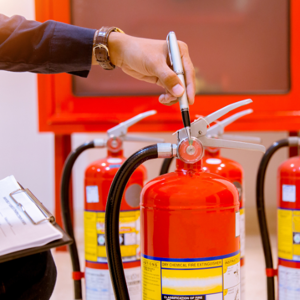
A home fire occurs every 86 seconds in the United States, according to the National Fire Protection Association (NFPA). These fires result in thousands of deaths and injuries each year, along with billions of dollars in property damage. While the numbers are alarming, some of the harm caused by residential fires is avoidable. A strong home fire safety plan can improve your policyholders’ chances of escaping a fire safely and, in some cases, it may help them avoid one altogether. Share these three important tips on fire safety with your policyholders to help spread awareness.
The best way to stay safe from fires is to stop them from occurring in the first place. Start by implementing the fire-prevention measures below:
HOME FIRE PREVENTION
Keep flammable materials away from heat sources. If you're using a portable space heater, keep it at least 3 feet away from flammable objects like furniture, blankets, electronics, and anything combustible.
Don't leave flames or smoking materials unattended, including fireplaces, stovetops, candles and cigarettes. Avoid smoking indoors, and never smoke in bed.
Fix or replace frayed electrical cords or wires.
Don't overload wall outlets or extension cords.
Have your furnace or home heating source periodically inspected and kept in good working order.
Make sure everyone in the household understands the importance of home fire safety and observes fire-safe habits, including your kids.
Get more fire prevention and safety tips from Ready.gov.
HOME FIRE SAFETY EQUIPMENT
A good home fire safety plan includes having the right supplies and safety equipment on hand. These tools will be your first line of defense in the event of a fire, and they can dramatically improve your ability to react effectively.
Install smoke detectors on every floor of your home, in every bedroom, and outside each sleeping area.
Inspect and maintain your smoke detectors.
A fire extinguisher can keep small, containable fires from growing out of control. Have an extinguisher handy whenever you use cooking or heating equipment.
Learn how to use a fire extinguisher.
Consider installing an automatic sprinkler system in your home.
FIRE SAFETY PLANNING
During an emergency, reaction time is critical. Beyond the equipment you need, everyone in your household should know what to do if a fire starts. Here are some tips to get you started:
Create a fire safety plan that establishes at least two escape routes and a safe location away from the home where everyone can meet.
Make an emergency communications plan to stay in contact during and after a fire.
Practice your escape plan twice a year so everyone can act quickly when it counts.
Teach children how and when to call 9-1-1.
Don't let a fire catch your policyholders off guard. The right preparations and an effective home fire safety plan can mitigate the risk of injury or damage during a residential fire or help prevent a fire emergency altogether. If disaster does strike, ServiceMaster Restore is here to help your policyholders through the traumatic event of a home fire. With over 65 years of industry experience, you can count on us to provide your policyholders with the peace of mind they need.
